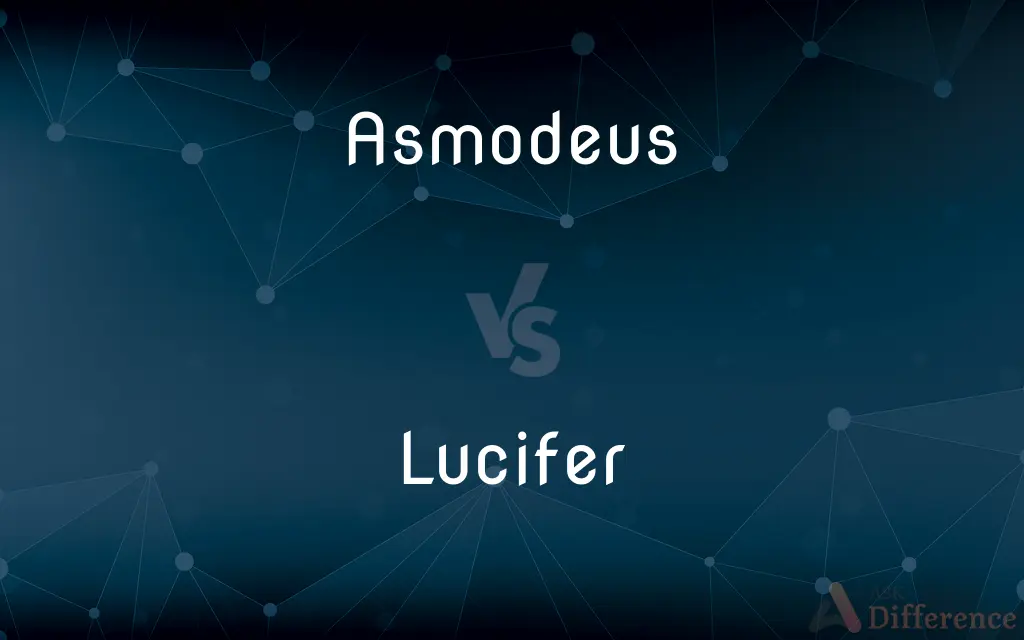Asmodeus vs. Lucifer — What's the Difference?
By Tayyaba Rehman — Updated on August 23, 2023
Asmodeus is a king of demons primarily known from the deuterocanonical Book of Tobit. Lucifer originally refers to the "morning star" and later became synonymous with a fallen angel or the Devil in Christian theology.

Difference Between Asmodeus and Lucifer
Table of Contents
ADVERTISEMENT
Key Differences
Asmodeus is a figure primarily derived from the deuterocanonical Book of Tobit, where he is a demon who torments Sara, Tobit's daughter-in-law, by killing her seven successive husbands on their wedding nights. Lucifer, on the other hand, is a Latin term meaning "light-bringer" or "morning star". In the Old Testament, the term "Lucifer" was used to describe the King of Babylon in a metaphorical sense, indicating his fall from power and grace. However, later interpretations, especially in Christian traditions, linked Lucifer with the rebellious angel who was cast out of heaven, ultimately associating him with Satan or the Devil.
The distinction between Asmodeus and Lucifer is rooted in their respective sources and roles within those sources. While Asmodeus is a malevolent force in a specific story, focused on hindrance and destruction, Lucifer's transformation from a descriptor of the morning star to a representation of the Devil illustrates a broader evolution in religious and cultural narratives.
Both entities are emblematic of evil or defiance in their respective traditions. Yet, their representations differ in origins and the nature of their malevolence. While Asmodeus has connections to lust and specific acts of harm, Lucifer's association with pride and rebellion represents a broader, more existential defiance against divine authority.
Comparison Chart
Origin
Deuterocanonical Book of Tobit
Originally Latin for "morning star"
Role
King of demons, associated with lust
Once a celestial being, now the Devil
ADVERTISEMENT
Primary Sin
Lust
Pride
Depiction
Demon tormenting Sara
Fallen angel
Cultural Link
Middle Eastern mythologies
Christian theology
Compare with Definitions
Asmodeus
A demon primarily known from the deuterocanonical Book of Tobit.
In the Book of Tobit, Asmodeus torments Sara by killing her husbands.
Lucifer
Originally a term for the "morning star" or "light-bringer".
In ancient texts, Lucifer was used to describe the brightness of Venus in the morning sky.
Asmodeus
A figure derived from ancient Middle Eastern mythologies.
Earlier depictions of Asmodeus can be found in Persian and Assyrian tales.
Lucifer
A fallen angel cast out of heaven in Christian theology.
According to tradition, Lucifer's pride led to his downfall from celestial grace.
Asmodeus
A king of demons associated with lust and other vices.
Asmodeus's reputation as the demon of lust precedes him in many cultures.
Lucifer
Synonymous with Satan or the Devil in many religious interpretations.
Over time, Lucifer became the name many associated with the ruler of Hell.
Asmodeus
A malevolent entity known to hinder or harm humans.
Many feared Asmodeus for his notorious deeds against humanity.
Lucifer
Represented as the embodiment of pride and rebellion.
Lucifer's defiance against divine authority is a cautionary tale for many believers.
Asmodeus
An embodiment of evil in specific religious narratives.
In certain stories, people sought protection from the wrath of Asmodeus.
Lucifer
Lucifer is the name of various figures in folklore associated with the planet Venus. Originally stemming from a son of the personified dawn, the goddess Aurora, in Roman mythology, the entity's name was subsequently absorbed into Christian folklore as a name for Satan.
Asmodeus
Asmodeus (; Ancient Greek: Ἀσμοδαῖος, Asmodaios) or Ashmedai (; Hebrew: אַשְמְדּאָי, ʾAšmədʾāy), also Asmodevs, Ashema Daeva or Amias (see below for other variations), is a prince of demons, or in Judeo-Islamic lore one king of the earthly spirits called the Ars Goetia, mostly known from the deuterocanonical Book of Tobit, in which he is the primary antagonist. In Peter Binsfeld's classification of demons, Asmodeus represents lust.
Lucifer
(Bible) An angelic being who was cast from heaven as punishment for his rebellious pride. Lucifer is traditionally identified with Satan.
Asmodeus
A demon appearing in the biblical book of Tobit, considered in the Talmud to be the king of demons and depicted in later Jewish tradition as a mischievous sprite.
Lucifer
Lucifer A friction match.
Lucifer
A match{1} made of a sliver of wood tipped with a combustible substance, and ignited by friction; - called also lucifer match, and locofoco, now most commonly referred to as a friction match. See Locofoco.
Lucifer
The planet Venus in its appearance as the morning star. Also called Phosphorus.
Lucifer
A self-igniting match, ie. one which could be lit by striking on any surface (as opposed to safety matches which only light against the material on the side of the box).
Lucifer
The planet Venus, when appearing as the morning star; - applied in Isaiah by a metaphor to a king of Babylon.
How art thou fallen from heaven, O Lucifer, son of the morning! how art thou cut down to the ground which didst weaken the nations!
Tertullian and Gregory the Great understood this passage of Isaiah in reference to the fall of Satan; in consequence of which the name Lucifer has since been applied to Satan.
Lucifer
A genus of free-swimming macruran Crustacea, having a slender body and long appendages.
Lucifer
(Judeo-Christian and Islamic religions) chief spirit of evil and adversary of God; tempter of mankind; master of Hell
Lucifer
Lighter consisting of a thin piece of wood or cardboard tipped with combustible chemical; ignites with friction;
He always carries matches to light his pipe
Lucifer
A metaphorical descriptor used in the Old Testament.
The term Lucifer was applied metaphorically to the King of Babylon in the Book of Isaiah.
Common Curiosities
What is the primary source for Asmodeus?
Asmodeus is prominently featured in the deuterocanonical Book of Tobit where he torments Sara.
Is Asmodeus exclusive to Christian traditions?
No, Asmodeus has origins and depictions in earlier Middle Eastern mythologies, including Persian and Assyrian tales.
How did Lucifer become synonymous with Satan or the Devil?
Over time and through various religious interpretations, especially in Christian traditions, Lucifer evolved from being the "morning star" to being identified with a rebellious angel, and then the Devil.
Does Asmodeus have any other roles besides being a demon?
Asmodeus is often depicted as a king of demons, associated particularly with lust and certain vices.
Why is Lucifer often associated with pride?
In Christian theology, Lucifer's fall from heaven was due to his pride, leading him to challenge divine authority.
How do the stories of Asmodeus and Lucifer differ in their teachings?
While Asmodeus's tale in the Book of Tobit warns against specific vices like lust, Lucifer's story offers a broader caution against pride and rebellion against divine order.
How is Lucifer related to the term "morning star"?
Lucifer originally means "light-bringer" or "morning star", referring to the brightness of Venus in the sky.
Can we find Asmodeus in mainstream popular culture?
Yes, Asmodeus has been referenced in various forms of media, from literature to movies, though not as widely recognized as Lucifer.
Which entity, Asmodeus or Lucifer, has a broader cultural influence?
While both have significant influences, Lucifer, due to his association with the Devil, has a broader cultural and theological impact.
Do both Asmodeus and Lucifer represent evil?
Yes, both figures are often seen as embodiments of evil, though in different capacities and narratives.
Share Your Discovery

Previous Comparison
Entree vs. Entry
Next Comparison
Enshroud vs. ShroudAuthor Spotlight
Written by
Tayyaba RehmanTayyaba Rehman is a distinguished writer, currently serving as a primary contributor to askdifference.com. As a researcher in semantics and etymology, Tayyaba's passion for the complexity of languages and their distinctions has found a perfect home on the platform. Tayyaba delves into the intricacies of language, distinguishing between commonly confused words and phrases, thereby providing clarity for readers worldwide.














































